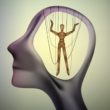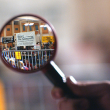What Life is Like When you Are not Alive
by Dr. Dennis Bonnette
Filed under Anthropology

Ever wonder what it is like to be in the next life, that is, to be dead? (I thought it best to leave the word “dead” out of the title of this essay.) Since this is something we all must face sooner or later, I thought it might be of interest to engage in some rational speculation about what a human being experiences, if anything, after he becomes unconscious for the last time. This is not a theological enquiry. So, depictions of hellfire and eternal bliss, though they may be... Read More
Free Will Disproved by Science?
by Matt Nelson
Filed under Anthropology, Science

For those who reject the notion of free will, our experience of making our own decisions is nothing more than a deep-seated illusion. “The reality is,” insists biologist Anthony Cashmore, “not only do we have no more free will than a fly or a bacterium, in actuality we have no more free will than a bowl of sugar.” Those who argue for the nonexistence of free will often do so on scientific grounds. And those who offer a scientific “proof” against free will point... Read More
Just What Are Men and Women, Anyway?
by Joe Heschmeyer
Filed under Anthropology, Sexuality

Sometimes, the most important questions are the basic ones. Back in 2011, I argued that the most important question in the gay-marriage debate was “What is marriage?” The next year, Robert George, Ryan Anderson, and Sherif Girgis published a book exploring just that question: What Is Marriage?: Man and Woman: A Defense. But in the face of contemporary questions of transgenderism and gender identity, it turns out that we need to ask a yet more-basic question: what... Read More
Sympathy for the Borg
by Matthew Allen Newland
Filed under Anthropology, Movies/TV

The idea of the mystical body of Christ has always been one of great interest to me, as there was always something about it at odds with the mentality in which I was raised: "Be yourself", etc. was (and remains) the mantra of the day, and the whole idea of being but a single part of something larger did not always sit well. I remember being a ten-year-old watching as the Borg stripped Captain Picard of his identity and "assimilated" him into their collective (his pronoun "I" replaced with... Read More
8 More Keys to the Catholic Environmental Vision
by Kevin Aldrich
Filed under Anthropology, Atheism, The Church

This post will articulate the final eight of fourteen principles that I think underlie the Catholic environmental vision. Part one ended on the thought that the first six principles imply a positive and optimistic attitude toward the natural world, the creator, and the human race. Principle seven, however, is not positive, since Catholicism holds that at the very beginning, something happened which damaged the way man relates to creation. Original sin has disrupted the harmony that ought... Read More
Can Catholics and Atheists Agree on the Environment?
by Kevin Aldrich
Filed under Anthropology, Atheism, The Church

Tomorrow (June 18), Pope Francis will release his long-awaited teaching document on the environment and human ecology. With that in mind, I wrote this article to articulate some principles that underlie the Catholic environmental vision, with the hope that atheists can better understand it and perhaps find common ground. I don’t know if these principles have been set out systematically, but in my research, I have uncovered fourteen. My selection of them is my own, as is the order... Read More
Five Questions for Supporters of Gender Transitioning
by Trent Horn
Filed under Anthropology

In light of the Vanity Fair cover story about Bruce Jenner’s decision to undergo a "gender transition" and current desire to be called Caitlyn Jenner, I thought it would be appropriate to look at five important questions those who support gender-transitioning need to answer. 1. What determines reality: facts or feelings? My wife used to work at a psychiatric hospital where it was standard procedure to not feed into a patient’s delusions. If a patient, for example, said he was a cat,... Read More
Why Materialism and Dualism Both Fail to Explain Your Mind
by Patrick Schultz
Filed under Anthropology

NOTE: This is a follow-up article to Patrick's post on Wednesday titled, "Body, Soul, and the Mind/Brain Question". Having laid the foundation of the human soul in Wednesday's post, let us now turn to its proper character and function. According to St. Thomas Aquinas, man’s soul comprises all those powers proper to lower organisms, namely metabolism, sensation, and locomotion; however, a still higher power remains that is non-existent in all other soul-possessors—intellection.... Read More
Body, Soul, and the Mind/Brain Question
by Patrick Schultz
Filed under Anthropology

In addition to my recent article, “Atheism and the Personal Pronoun,” Strange Notions has featured several related pieces, “Exorcizing the Ghost from the Machine” by Matthew Allen Newland, and more recently “Exorcising Epistemology” by Matthew Becklo. True to the spirit of the Areopagus and mission of Strange Notions, these authors and I have approached the much-debated topics of the mind-brain problem and consciousness from different perspectives, arriving at subtle and nuanced... Read More
Irreconcilable Differences: The Divorce of Materialism and Truth
by Philip Lewandowski
Filed under Anthropology, Belief, Evolution

According to many today, the advance of the natural physical sciences continues to shrink the “space” for God. The “gaps” where someone can place God are decreasing, and therefore the “God hypothesis” will one day be swallowed whole by the progress of the scientific endeavor. Even more, the “space” where one could posit the human person as something more than just a complex, organized collection of matter and energy is said to have disappeared. While I find a materialist... Read More






